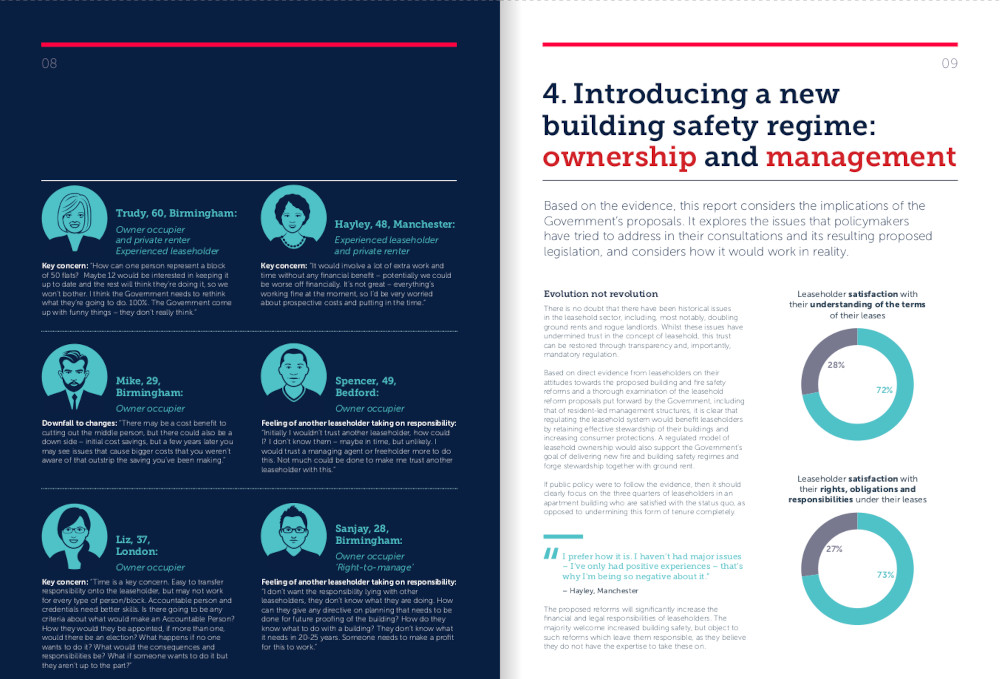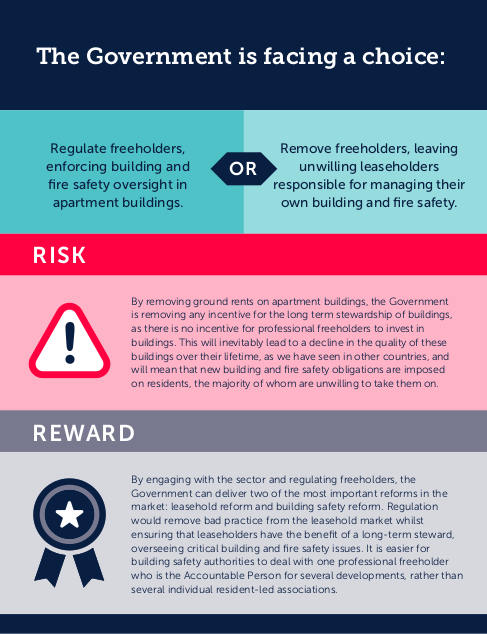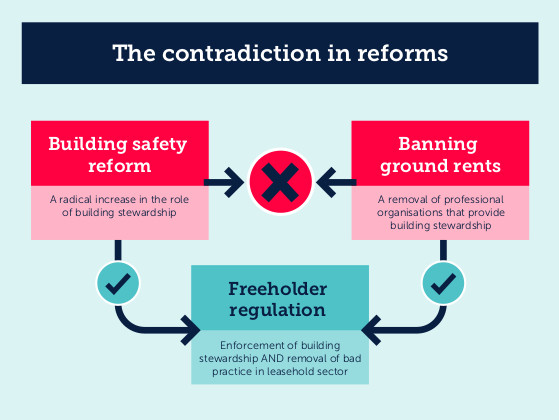Underlying this report is the question: Would you REALLY like to be the ‘responsible person’ if there were a second Grenfell?
Freeholders urge government to water down leasehold reforms to allow modest ground rents and keep monetising landlords (ie themselves)
But there ARE a few freeholder rogues, they concede …
Crucially, fire safety is too important to be left to leaseholders and they don’t want the responsibility, the report claims (based on questioning six of them, it seems)
Leave fire safety to building’s responsible “long-term custodians” ie secret investors in buildings’ income streams often based offshore …
Commonhold has failed, it is claimed …
Scotland’s flats going to the dogs because there are no monetising freeholders like in England
And Australian strata is not nearly as good as English leasehold tenure either
But … leasehold houses and doubling ground rents were a step too far, the report says, even though Tchenguiz, Long Harbour and Wallace scooped up these top-paying freeholds

The largest freehold-owning organisations, responsible for 850,000 flats, are fighting back against leasehold reforms by contrasting them with the responsibilities of the Building Safety Bill.
In particular, they are highlighting the obligations of the proposed “responsible person” who will have oversight of fire safety regulations and suggest that self-managed blocks will be unqualified or unwilling to assume these responsibilities.
The very serious matter of fire safety is best left to professional, long-term custodians of blocks of flats, such as the Tchenguiz Family Trust (ultimately based in the British Virgin Islands), Long Harbour (whose private equity owners are hidden and often offshore, with some involvement of Hong Kong veteran financier Li Ka-shing and his Hutchison Whampoa group) and Wallace Estates (a fund where ultimate ownership of freeholds is also secret in a fund set up by Norfolk based Italian Count Luca Rinaldo Contardo Padulli).
It is a measure of the freeholders’ desperation that they are challenging the government’s pledge to set new grounds at zero and the Law Commission’s leasehold reform proposals – which include a revived commonhold – with a published report.
This is the first time that the freehold sector has launched a public initiative to argue its case. It marks a contrast with the behind-closed-doors lobbying by Pagefield – other obliging helpers being Conservative PR outfit Crosby Textor – that resulted in this:
Called “Rebalancing the relationship between freeholder and leaseholder”, the freeholders’ report has been carried out by marketing company Savanta.
It is purportedly based on detailed interviews with six leaseholders and a further 1,000 responded on line.
However, LKP, the National Leasehold Campaign and the various cladding groups are aware of only one leaseholder who took part, which is curious given the tens of thousands of leaseholders, including RTM / RMC directors, who regularly communicate with us.
The rather approximate data set of leaseholders responding to the freeholders’ report contrasts with the thousands of responses from identifiable individuals to the Law Commission and the Communities Select Committee in their various consultations; and the Competition and Markets Authority, which commissioned Ipsos Mori to poll 1,050 leaseholders, where far higher satisfaction was encountered among leaseholders in self-managed sites rather than blocks where the management is imposed by a monetising freeholder.
The report makes a cunning play to raise leaseholders’ concerns over fire safety responsibility in the Building Safety Bill as grounds to neuter serious reform of leasehold and leave management in the hands of commercialising freeholders.
Nonetheless, it is welcome that freeholders are arguing their case in a forum of public debate.
The most effective propagandists for the status quo are the parti pris trade bodies such as ARMA (which also uses Pagefield’s lobbying services), ARHM, RICS and the training body IRPM, which seldom pass by an opportunity to criticise leaseholder self-management.
It is perhaps understandable, not least because monetising freeholders control more than 80% of private flats and pay these property foot-soldiers their wages.
Here are a few points challenging the assumptions of freeholders’ report:

[The government is] “seeking to remove professional landlords from the market”.
It isn’t. The government has not endorsed the Law Commission reforms and its repeated policy – and long awaited – ban on future ground rents would not affect existing ones.
However, the reforms would deprive those who seek to create an investment asset in other people’s homes of a future.
England and Wales are out of step with the rest of the world.
“Now is the time for policymakers to work with industry to ensure this once-in-a-generation opportunity to radically reform the management of building and fire safety is effectively implemented to the benefit of residents.”
The notion that anonymous, offshore speculators in the income streams of residential buildings are interested in the residents’ welfare is, to put it at its most polite, arguable.
The 2014 Office of Fair Trading report into how pensioners in retirement flats, where the freehold was owned by Tchenguiz as was the management company Peverel, ended up buying electronic door entry systems off Cirrus (ownership, ditto) in a rigged bidding procurement process was curiously enough not mentioned in the freeholders’ report..
No matter, you can catch up here:
https://www.betterretirementhousing.com/peverel-cirrus-price-fixing-story-far/
“Where policymakers have sought to devise a radical new “building safety regime” that enhances the role of freeholders and intensifies the stewardship function they already provide, they have also consciously begun to force them out of the sector by eliminating ground rents …”
Worth recalling that Long Harbour’s Adriatic Land 3 Limited is on the MHCLG “list of shame” for not doing enough to remediate its cladding sites. As is E&J Capital Partners, the Winchester-based sizeable punter in ground rents, which is not involved in this report.
“The perspective of leaseholders is crucial because, if the Government’s leasehold reform agenda does not maintain a role for professional freeholders, then they are the ones who will be left with a series of new financial, legal and, in some cases, potentially criminal obligations [sic].”
As part of the Law Commission consultation on right to manage reform, LKP rounded up directors of right to manage companies and resident management companies, many of prime London sites. They are managing sites worth well over £1 billion and are unlikely to be unnerved by fire safety responsibilities or, if we can understand the above, inadvertently fall into criminal liability.

“Regulating freeholder practices and setting ground rents at an affordable rate for apartment buildings whilst eliminating ground rent on other homes, will foster innovation in a sector that greatly needs smart policy to drive positive change. This will have the desired dual effect of driving out rogue freeholders and enshrining the much needed new building safety responsibilities in law.”
Looks like the freeholders agree that spreading leasehold houses was pushing things too far, although all three groups invested in freeholds of houses with aggressive ground rents. Here is Long Harbour’s Adriatic Land 2 Limited wanting £40,000 for a freehold:
“The evidence that emerges from Savanta’s research signals that leaseholders are reluctant to accept the Accountable Person role due to concerns around competence, legal exposure and the time commitment required …”
The leaseholders may not have been asked precisely: Would you REALLY like to be the ‘responsible person’ if there is a second Grenfell? But that appears to be the thought lurking behind this “independent, qualitative and quantitative piece of research” by the marketing smoothies at Savanta.
“The evidence presented in this report proves beyond doubt that leaseholders are very concerned about taking on obligations for building and fire safety as required in the Government’s introduction of an Accountable Person.”
Additional responsibilities are heading towards directors of RTMs / RMCs and they would be sensible to be alert to the Building Safety Bill.
But … LKP has not been contacted by any leaseholder management company seeking to hand responsibility for a building back to the ground rent speculator.
“The obvious conclusion that should be drawn from the evidence is that the role of the Accountable Person is best performed by a well-resourced professional freeholder with a long-term interest in apartment blocks. This appears to be a position the Government supports.”
Leaseholder controlled blocks are roughly estimated to amount to 17% of all private apartment blocks. All but the smallest employ professionals to manage them … as do the offshore private equity freehold owners.
The only difference is that you can find the name of the leaseholder directors on Companies House, whereas the freehold owners in the Long Harbour and Wallace Estate funds have gone to considerable trouble to remain secret. Why?
“In large and often complex apartment buildings, only a professional freeholder has a long-term interest in the life-cycle of the building. On average, leaseholders have up to a five or seven year interest in their home, and therefore, by definition, have a short-term interest in the maintenance of the building and are sometimes reluctant to commit major funds to necessary long-term works when the individual leaseholders will gain no benefit. Fire safety can only be overseen by an independent arbiter with a long-term interest.
“In the case of professional freeholders, their interest is intrinsically linked to the life-cycle of the buildings, as the investors who purchase ground rent contracts are deploying capital for the long term, like pension funds.”
Freeholds amount to only 1-3% of the value of a block of flats. The value of a building is in its leases. Why on earth should the leaseholders not be in charge of its management?
Indeed, the Law Commission report on right to manage reform was so persuasive it invited the thought: why aren’t all blocks of flats sold with a residents’ management company unless there is a compelling reason not to do so?
Secondly, it is the case that freehold speculators have a long-term interest in a building’s income streams, but that is entirely separate from the physical state of a building, which does not affect them.
Whether a block of flats is pristine or a slum does not matter. These rundown flats near Birmingham paid out £8,000 a year in ground rent:
“By removing ground rents on apartment buildings, the Government is removing any incentive for the long term stewardship of buildings, as there is no incentive for professional freeholders to invest in buildings. This will inevitably lead to a decline in the quality of these buildings over their lifetime, as we have seen in other countries.”
Investors in ground rents were deaf for three years to ministers’ appeals that they pay for the cladding remediation at “their” buildings. Not a single one did so. Legal and General did at the Blenheim Centre in Hounslow, but it owned the shopping centre below as well, so it was already in for a big share of the bill. All the other contributions came from developers who owned the freeholds, such as the Berkeley Group.
Secondly, the government is not proposing to remove existing ground rents. Just stopping the creation of new ones.
The leaseholders of prime, multi-million pound London Docklands sites Canary Riverside and West India Quay appear to be ungrateful to the stewardship of their freeholder John Christodoulou and court appearances seem unending:
“Savanta conducted six in-depth qualitative interviews and subsequently 1,000 online quantitative interviews with leaseholders of varying demographics throughout England and Wales in January and February 2020.”
Er … Thankfully the Law Commission and the Communities Select Committee spoke to more than six leaseholders, and CMA polled 1,050 with Ipsos MORI (who preferred leaseholder controlled management over freeholder-imposed management).
We are sceptical about the “1,000 online quantitive interviews” (even if we knew what it meant).

“Attitudes to the existing model of leasehold ownership were varied, but overall, satisfaction was significantly higher than many reports have suggested. When asked whether they were happy with the level of information, rights and responsibilities they currently have, 3 out of 4 leaseholders responded positively.”
Well, the Leasehold Advisory Service found that 57% of leaseholders regretted their decision to buy a leasehold property:
“There is no doubt that there have been historical issues in the leasehold sector, including, most notably, doubling ground rents and rogue landlords. Whilst these issues have undermined trust in the concept of leasehold, this trust can be restored through transparency and, importantly, mandatory regulation.”
A bit of a change of tack, given the freeholders steadfastly denied there were problems for years.
If the repeated efforts to reform leasehold have not worked, perhaps the answer is to stop creating more of it.
“Do leaseholders want more responsibility? The duty-holders are the people who are legally responsible for ensuring the building is designed and built to be safe for its residents.
“… The sentiment towards undertaking the role of the Accountable Person, or trusting fellow leaseholders to do so, is overwhelmingly negative.”
How about asking: Do you want to buy a flat in a block where building regulatory failures mean the developer has used combustible cladding, and sold the freehold interest to a speculator offshore? Would you be happy for the freeholder to get a court ruling to say that you are responsible for paying to put matters right – while his income streams will be completely unaffected – and will forfeit your home if you fail to do so?
That was the prospect facing thousands of leaseholders before the government said it would pay up for cladding remediation. As for the huge associated costs – waking watch; additional insurance – leaseholders will still pay.
Flats in Scotland worse than England’s leasehold ones …
The freeholders’ report is highly critical of reforms to leasehold law in Scotland, which it appears to misunderstand and incorrectly cites a law that does not in fact exist. It also cites reports on the poor physical state of Scotland’s flats compared to those in England, where freeholder-imposed management prevails.
The report’s comments on Scotland can be read here:
Australia is no better, the report suggests …
The freeholders also criticise Australia’s strata title, a form of commonhold that has been adopted by several other countries as a model for communal ownership such as flats.
“In recent years, Australia has experienced significant problems with resident-led models of ownership and management … with the most common reason for dissatisfaction being committee members acting in their own interest, rather than in the interests of all owners.
“39% of respondents said coming to an agreement regarding the running of their scheme was problematic, which was mainly due to major expenditure, including repairs (Governing the Compact City: The Role and Effectiveness of Strata Management in Higher Density Residential Developments (City Futures Research Centre, University of New South Wales, 2012).”
The issues raised in the report about Australia are being addressed by LKP’s Australian land law experts, and we will deal with these issues later.
We have hosted the author of the report cited above at LKP’s meetings organised for the APPG for leasehold and commonhold reform (of which we are the secretariat).
The report seems to believe: stewardship of flats is too important to be left to those who own them …
But the finale of the report is to urge government to reconcile leasehold reforms (setting ground rents to affordable rates) and Building Safety, which cannot be left to leaseholders.
“The principal function of regulation in the residential leasehold sector is to define the stewardship provided by freeholders in the context of overseeing the management of building and fire safety.
“In line with the Government’s proposals to introduce a duty-holder regime, professional freeholders will take on the responsibility of the Accountable Person. They will ensure building fire and structural safety risks are reduced as much as reasonably practicable when people are living in the building.
“Residents would still have the option to collective enfranchisement and take over the management of their block, but the system would also provide for the existence of regulated freeholders where residents do not want these obligations.”
An obvious answer to this would be to set up all new blocks with proper leasehold management structures and see how many of them want to hand over these powers to anonymous offshore entities (or when onshore and known, pretty unsavoury ones at times, as the report concedes).
However burdensome these responsibilities may be, it is far preferable to carry them out yourselves rather than to delegate the task to freeholders who have demonstrated repeatedly their intent to monetise the asset in every conceivable fashion: in addition to ground rents: permission fees; insurance and other commissions; lease extension and enfranchisement monetising. (These being the polite ones.)
The report goes back to a “freeholders’ code of practice”, first punted out at the height of the ground rent scandal by the House Builders Federation.
The full report Rebalancing the relationship between freeholder and leaseholder can be read here.






 Beware ‘MacDUFF’ Scottish consumer-friendly land laws, say freeholders in lobbying report to save their incomes
Beware ‘MacDUFF’ Scottish consumer-friendly land laws, say freeholders in lobbying report to save their incomes






















If Abraham Lincoln were alive today and read how these heartless corporate suited parasitic freehold blackmailers were trying to bolster up their dying trade, I am sure he would have used a statement he is reputed to have said…..
‘You can fool all of the people some of the time and you can fool some of the people all of the time….BUT YOU CAN’T FOOL ALL OF THE PEOPLE ALL OF THE TIME….
My advice … try to find an occupation which doesn’t give you a sleepless night if you don’t get your pound of flesh…